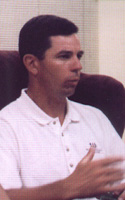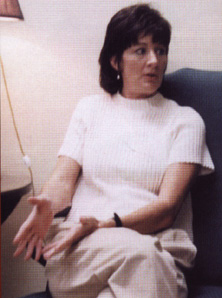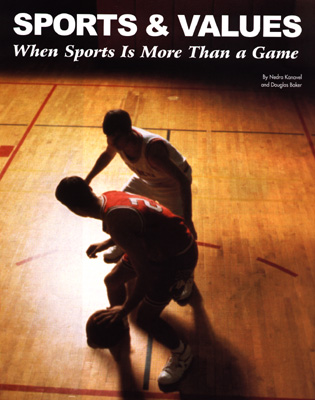| Kanavel: In Union's long-range planning document, Vision
and Values: 2002, the athletic department states its goal is to instill loyalty,
pride and self-discipline in students. Would you say that sports, from T-ball to the
professional arena, nurtures the development of these positive values? Rushing:
If the coaching is done correctly, sports can do that. More and more I see coaching done
in a way that I don't think is correct. More and more today's coaching does just the
opposite of instilling positive values in young people.
Kanavel: So what is the correct way and what is the incorrect way?
Hutchens: The correct way is doing sports for the students and their
sake, showing them how to learn skills, to socialize with others, to make friends, and to
have fun. But there is a lot of pressure put on young athletes, too. I've gone to a church
basketball game of six-year-olds. As I'm keeping score on the board, the first thing my
niece says to me when she comes off is, "We lost." I don't think placing
emphasis on winning and losing is the correct way to coach. Athletes eventually have
to learn to handle winning and losing, but they have to first learn to enjoy the game
itself.
Turner: With little kids, being a part of a team is important.
Learning to lose yourself in something bigger than yourself is something everybody needs
to learn. I think that's the key value to teach little kids as well as collegiate
athletes. In fact, that's the single greatest thing we try to teach our students.
Rushing: I agree. When you take a seven-year-old league and pick an
all-star team, that
defeats the concept of the whole being more important than the individual. That's the
type of thing that bothers me a great deal.
Hutchens: It's important to teach people respect for others, for
authority, and for the game, too. That's the biggest lesson I try to teach to our
athletes. Watching TV sports, I can tell that respect is obviously a value we're not
seeing a lot of right now. But I think respect is the one thing you will see at Union's
athletic events. You'll also see the teamwork involved and the love of the game. It's like
Coach Turner said, it's evident that we don't have the star system that you have at other
places.
Turner: Coaches can teach different things at different levels. At our
level we can teach a work ethic, unselfishness and camaraderie. We can teach so many
things that are beyond what they can teach at that level. Most important, what we'd better
be doing is preparing our students for life, not just the mastering of a sport.

Ralph Turner
Men's Basketball
Campbell: The amount of work you put into something is directly
proportional to how much improvement you get and how much you learn. Also, being a part of
a team teaches athletes about the different roles each person has. One student might be a
star in football and learn how to be humble. And yet in basketball another player might
sit on the bench and learn to encourage others. If coaching is done right, it teaches
people about the different roles people have in life.
Turner: We're also trying to train in such a way that after Union, our
athletes will be the best workers somebody could have. They're going to be the most
disciplined, the most responsible and the most reliable.
Baker: That to me seems to be the exception. Sports in America have
taken on a life of their own. Some have described them as the new religion for middle-aged
adults and especially among young people. A sports columnist said that in some areas
college athletics have overshadowed academics. Speak to some of the issues which might
directly
impact a Christian university as you seek to build and maintain an athletic program.
Turner: About the idea that school sports are much bigger than
academics, that's a natural phenomenon. Sports caters to spectators. People can watch
football and basketball. They can't go to the chemistry department and watch a gifted
student research. There's no arena to watch him work; therefore, the public does not view
academics as exciting as sports. Professors may feel slighted, but I believe their
work is so much more important than whether our teams are winning or losing. Some people
may say that sports fans are idolatrous, but I don't think I would say that. Sports are
just more fun to watch.
Campbell: God has given us all a gift. Whether it's basketball,
baseball, or softball, to God be the glory. If sports are the vehicles that are most
popular in America, we ought to be using them for Him.
Hutchens: Universities will also tell you that alumni giving goes up
in universities where an athletic program is succeeding. A lot of that alumni giving would
then turn around and go to other areas.
Kanavel: Why is that?
Hutchens: Well, I think it's due to the exposure and the excitement.
There's nothing like going to a game with thousands of other people, with whom you have a
common bond. And it's like Ralph said, it's something to watch.
Turner: Our fans feel like when the Lady Bulldogs won the NAIA
championship, they had a part. Even though they weren't on the team, they followed them
and stuck with them throughout the whole season. As a matter of fact, I think a university
ought to embrace its athletic department.
Campbell: Sports can be a vehicle for our faith. Athletes who get a
lot of exposure could use that vehicle to send a positive message. Often they don't use
it. That's one of my biggest problems with a lot of athletes. Some Christian athletes use
their exposure to talk about and spread God's word, but some of them don't. We try
to impress upon our students that they're going to be out in front of everybody and that
what they do is very important to their teammates, the coaches and the school. They
represent those things
each time they walk off campus.
Rushing: As far as teaching Christian values goes, what we should do
is no different from what the English or Biology department should do.

Andy Rushing
Men's Baseball
Turner: We're trying to raise the athletic program to the high
standards our academic people have already set.
Baker: I'd like to follow upon that. In recent days, events in
professional sports have cast a disheartening light on the place of sports in
society. It seems that some sports figures are exempt from the rules of obedience
and authority. How do you train athletes under your care to act both on and off the court?
Hutchens: In professional sports, winning and generating dollars are
the ultimate goals, not discipline. In our environment, we set boundaries and uphold them.
We don't teach our athletes chat we should win, regardless of their behavior. We teach
them Christian principles and apply them fairly.
Baker: Let's focus on a more general area. How do each of you
personally deal with seeing college athletes being arrested and being convicted of serious
crimes?
Turner: I keep hoping that one day Sports Illustrated might do a
20-page article about the only place in America where athletics is done right, and that's
at the NAIA level. Seriously, there are two sides to that issue. The rapes, sexual
assaults and drunkenness make you sick. But what if you get a guy who's accused of
something and he didn't do it? Do you take away his chance for success? Do you hold him
out of a bowl game before he's been proven innocent or guilty? If we want to crack down on
misbehavior in college sports, there will have to be a balance.
Rushing: For a coach, the easy way out is to say, "Here are the
rules. If you step over the boundaries, you're gone. You're no longer part of our program
if you don't represent us and what we stand for. That's the easy way.
Hutchens: Some students are going to be better just for having been
here at Union. Also, we don't treat everybody the same. We look at what our students'
backgrounds are. We don't all start on the same playing field.

Lisa Hutchens
Women's Basketball
Turner: In the book of Hebrews, it says God disciplines those who He
loves. It's the same thing with us. We all deal with students in different ways. Some take
yelling, some take patting, some take hugging. The important thing is for them to know
we're motivated by love.
Kanavel: Let's say you have an athlete who could be the next Michael
Jordan. What can he expect when he leaves here and enters pro sports? How will he deal
with the
conflict between the Christian message Union has taught him and the seemingly twisted
values of pro sports?
Rushing: We have three active baseball players now in pro ball. I know
the world
they're living in. It's a far cry from what they experienced here. One of them has just
signed a contract. He called me last week, laughing about the type of language that had
been directed his way since he has been in the professional environment. He said,
"You didn't really prepare me for that."
Turner: They are also learning how to deal with the money they'll be
earning in pro sports.
Rushing: And the peer pressure.
Hutchens: That's true. The road does get lonely.
Turner: What we all hope for is this: We hope we've instilled a
balance in athletes' lives. We hope that they understand sports is going to fade away, and
they'd better have something that's going to last beyond their ability to play sports.
Rushing: Luis Ortiz played baseball here a few years ago. He's
in the big leagues now,
and it's been a struggle. We talked just this month about him ending his career because
he said, "It is more important to me to be a great husband and a great father than it
is to be a great ball player." I think he's been able to get through the tough times
because of
being grounded in Christian principles. I know that for a fact.
Hutchens: One of the reasons Luis has done so well is because he was
able to establish a close relationship with his coach. He might not have found that at a
state school. At Union our role as coaches is a lot different. We have so much access to
our kids everyday. It's not anything for them to call us at home, when they need
something. I'm not sure you find that a lot of times at other levels.
Turner: Going back to college and pro athletics being messed up, we
have so much more freedom at Union. Some coaches can't say any prayers. They have to say a
generic
prayer to a generic god. We have so much more access to talk freely about our faith. I
think we have a chance at Union to instill a personal relationship with Jesus Christ.
It's so much more easily spoken about here. The most important thing is that our
kids have a relationship with Jesus. Mark can lead a Bible study, we can pray, and
we can talk
about what God has given us. Our faith is an important part of what we're doing here. I
think that's another reason the best things that are happening in athletics are going to
happen at Union.
Baker: I'm reminded of Paul's admonitions to Timothy. They often
center upon sports events or athletes. Throughout Paul's letters, he makes reference to
athletic disciplines and events. What are some issues or lessons you have read in
Scripture that you use in your coaching?
Turner: The scripture that I like best is Philippians 1:6: "God
is the one who began this good work in you, and I am certain that he won't stop before it
is complete on the
day that Christ Jesus returns. The idea is we're all a work in process. I love our
students. All the time I'm worried about them and thinking about them. But they have one
thing in common: they're all a work in progress. And for the few years they're here, we
can help mold and shape them. They have to find themselves, too. They have to see that the
values we talk about are real.
Rushing: Along the same line, one of the things that has really helped
me professionally in dealing with frustrations and failures is that I've become a lot more
concerned with the process than with the end result. There was a time not too long ago
when if we didn't win X number of games, if we didn't win a championship, if we didn't
advance so far in post-season play, I regarded the whole year as a failure, a personal
failure. Then I learned that the way we went about our business was a lot more important
than how many games we won. Now I believe that if we concern ourselves with the process,
the end results will take care of themselves and I'll be able to sleep at night.
Campbell: I get real discouraged, too, when I think about the end
result and not the process. Coaches often put pressure on themselves to change lives.
Really though, it's God that's going to do it. The New Testament also talks about
the things that so many of our students face. Many times they don't realize that
Christians realistically struggle with many of the same problems.

Mark Campbell
Men's Basketball
Hutchens: I have been told before to never take a job you can't
improve on. In a year, I'll take over as head coach of the Lady Bulldogs. How can I
improve on a national championship? I don't know. I can remember the simple Scripture
about "I can do all things through Christ who strengthens me." I know that if I
will let Christ work through me, I can hopefully teach students some things and relate to
them. I'11 let them know that I'm human, and that I've dealt with some of the same things.
It's scary to think about our athletes looking to me as a role model. I hope they'll see
somebody who's been where they've been, and made some of the same mistakes. I'm a work in
progress, and I've got to have God's strength. That's something I've got to be able to
relay to students. If they will constantly search for that strength, they're going to find
answers to their questions, solutions to their problems, and be able to achieve things
that they weren't going to be able to achieve and appreciate those achievements, as well.
Campbell: When I started out, before I came here, I dreamed about
being a basketball coach. All this time I thought I'd be excited about coaching
basketball. Not until the last three or four years did I realize that what makes me happy
are the spiritual benefits of coaching. When God uses you, that's when you're the
happiest. Watching the players who don't really talk a lot begin to share things that they
struggle with is what makes me feel the best. Our relationships with the players are the
great things. Those are rewarding things. Now my excitement comes from watching God's work
in our students, not basketball.
Hutchens: When I considered a career in coaching, I thought about
trying to win state championships and games. This past year during my sabbatical study
leave from basketball, people asked me if I missed basketball. I didn't miss it. But I did
miss the everyday contact with athletes, and I did miss feeling like I might be able to
help them do something. Obviously I don't like losing, but I have found some of my
greatest victories to be in the little things, not the things that necessarily come on the
court.

|





